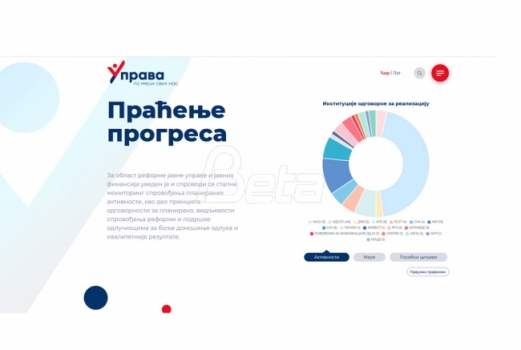The Ministry of Public Administration and Local Self-Government of Serbia encouraged the non-governmental sector, the academic community, international organisations, the press, civil servants, and other interested parties to access a brand new platform that offers all information about the progress in the area of public administration reform in one place.
The online platform was created thanks to a project of EU support for the public administration reform within the Sector Reform Contract.
“The idea behind the platform (https://monitoring.mduls.gov.rs/ ) launched mid-April, is to make the monitoring of public administration reform process more efficient, accessible, transparent, and engaging; to facilitate data and interaction analysis, thus enabling all decisions to be grounded in evidence,” Beta agency learned from Ljiljana Uzelac, the head of the Department of strategic planning at the Ministry of Public Administration and Local Self-Government.
She added that the platform allows everyone to monitor the reform process in real-time, on the one hand, and serves as a risk management tool, on the other, so as to prevent any backlog in the implementation of activities.
“Apart from the visual data overview, users can also filter the data by measures, activities, institutions, reporting periods, as well as programmed and spent financial resources. In other words, each objective of the reform can be browsed by specific measures of the objective, specific activities carried out as part of different measures, relevant institutions in charge of specific activities, the status of a particular activity (completed, outstanding, ongoing), deadlines for completion, as well as reporting periods, financial resources, either budgetary or from donations, that have been earmarked and spent,” Uzelac explained.
As Beta learned from the team leader of the EU project dedicated to public administration reform within the Sector Reform Contract, Peter Vagi, international experience shows that the more transparent a government is in its intentions and activities, the more support from citizens it gets, which, in turn, strengthens citizens’ trust in the government.
“Although similar tools are available in several EU Member States, this initiative is new in the region of the Western Balkans. Over the recent years, Serbian administration has continuously shown the presence of non-governmental actors in the public administration reform, as well as an increasing level of transparency with regard to the progress achieved in the reform,” Vagi said.
According to him, “this tool is another step in getting closer to citizens and businesses, allowing them to keep an eye on the reform process and joint the government in reaching ambitious goals of the reform.”
The platform can be used as a resource for vital data by the Government of Serbia and the line ministry in their role of decision-makers, but it can also be used by the ministry staff and civil servants.
The platform can be of use to the professional community, NGOs, research organisations, and institutes. As they pointed out, the platform will be updated on a regular basis as a rather useful database for research, analytical report preparation, or monitoring of the work of public authorities.
The platform can be useful for the international community, too. Organisations such as the European Union, OECD, the World Bank, and others can check the data there when assessing and compiling reports on the reform process in Serbia.
Journalists and media associations can also benefit from the platform to obtain information for the public and monitor the work of state authorities.
Furthermore, all citizens of Serbia can use the platform to influence the work of state authorities so that they become more responsible and improve their services.
The Ministry says that, although this is an analytical tool that may seem to be of interest only to civil servants and reform experts, the platform actually has an added value.
“This way, not only do we have plenty of data on the public administration reform available in real-time, but we also have all the data and documents in one place, thus enhancing the transparency of the reform process,” Ljiljana Uzelac stressed.
She added that, finally, by publishing and putting all the data in one place, all interested parties can see the status of the reform and voice their opinion. This will improve the quality of the dialogue while keeping state authorities under the watchful eye of the public and exerting additional pressure to achieve tangible and socially beneficial results.
The Ministry of Public Administration and Local Self-Government said that the goal of the reform is to have the “administration tailored to everyone’s needs,” with efficiency, openness, transparency, engagement, and reliability as fundamental principles guiding the decision-making process and service provision.
The strategic document laying out the framework for the public administration reform in Serbia is titled the Strategy of the Public Administration Reform, with an accompanying Action Plan that specifies each step in its implementation.
Given that this is a complex process that affects all parts of the society and numerous actors, from local self-governments to public enterprises and institutions, it requires coordination and follow-up. What is also requires is transparency, due to the fact that the reform is implemented for the benefit of the society and its citizens, the Ministry added.




